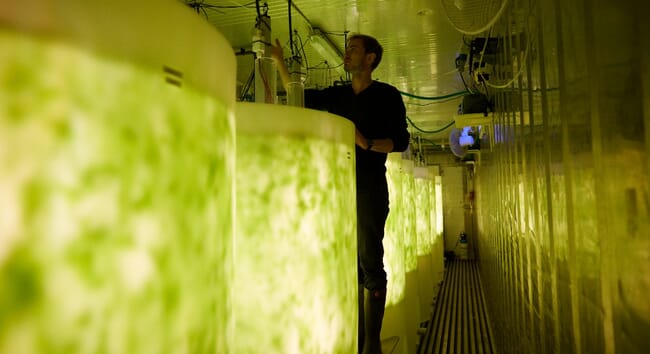
© Pure Algae
Over the next four years, researchers from the University of Copenhagen – together with Aarhus University and a range of companies – will work on a project called SeaFree to further develop a closed, sustainable cycle on land that utilises residual nutrients and CO2 from shrimp and fish farming to grow seaweed for the food and healthcare industries.
As Professor Marianne Thomsen from the Department of Food Science at the University of Copenhagen explained in a press release: "The project aims to use seaweed production to absorb and convert emissions from land-based aquaculture into a high-value product. Among other things, the seaweed will be used for dietary supplements that can prevent diabetes and sustainable foodstuffs innovations. In addition to capturing emissions that would have otherwise been emitted into the atmosphere and aquatic environment, the seaweed produced is both healthy and rich in umami flavour,"
The project’s starting point is a 40ft container setup equipped with eight 1,000-litre tanks. The container solution is a so-called Plug’n’Play technology with great export potential. By combining salt water, CO2 and nutrients with LED lights, the unit can produce a full batch of seaweed in just one week.
"SeaFree represents the latest in recycling technology for land-based shrimp and fish farming. Besides capturing emissions, the system also recirculates surplus heat from the plants to the Plug'n'Play technology. The project includes the development of a new technology that makes it possible to use surplus heat to dry the seaweed which is then sold to the healthcare industry. In this way, SeaFree contributes to a more sustainable and efficient production process," added Thomsen.
The final product consists of climate-friendly fish, shrimp and sea lettuce – a healthy, fibre- and protein-rich seaweed species. In addition to the production of various dietary supplements, sea lettuce is also used as an edible accompaniment when people buy seafood.
According to Thomsen, there is huge potential in farming fish and seaweed in the manner envisioned by SeaFree. If all the world's land-based shrimp and fish farms implemented the method, it could significantly reduce the CO2 footprint of global food systems.
The project, funded by Innovation Fund Denmark with DKK14.4 million (€1.9 million), is being carried out in a collaboration with the companies Pure Algae, DryingMate, Food Diagnostics, Sigrid Therapeutics, XOventure GmbH/Rigi Care, KOST, SOF Odden Caviar and HanseGarnelen.




